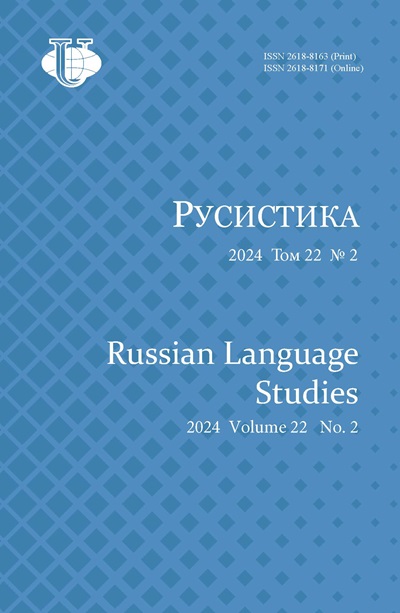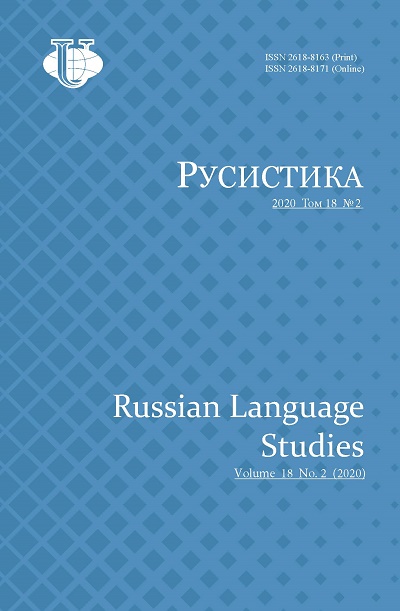Лексические средства экспликации речевой агрессии в русскоязычных печатных изданиях советского периода
- Авторы: Биюмена А.А.1
-
Учреждения:
- Минский государственный лингвистический университет
- Выпуск: Том 18, № 2 (2020)
- Страницы: 164-180
- Раздел: Актуальные проблемы исследований русского языка
- URL: https://journals.rudn.ru/russian-language-studies/article/view/23822
- DOI: https://doi.org/10.22363/2618-8163-2020-18-2-164-180
Цитировать
Полный текст
Аннотация
Актуальность статьи обусловлена распространенностью агрессивных материалов в медиапространстве, значимостью их роли в осуществлении воздействия на аудиторию. Цель работы состоит в выявлении и описании лексических средств создания речевой агрессии в русскоязычной прессе советского времени. Материал исследования составляют 500 статей на международную тематику, опубликованных с 1946 по 1989 г. в газете «Советская Белоруссия», издающейся в Белоруссии на русском языке. Использовались методы семантического, контекстуального и дискурсивного анализа. В ходе исследования выделены семантические группы лексики, использующейся в прессе указанного времени для выражения речевой агрессии. Теоретическая значимость исследования состоит в том, что определение специфики экспликации агрессии в газетных текстах конкретного периода вносит вклад в понимание особенностей медиадискурса как типа институциональной коммуникации. Практическая значимость заключается в выявлении агрессивных семантических доминант советской прессы послевоенного времени. Установлено, что речевую агрессию в проанализированных текстах выражают лексемы, обозначающие определенные идеологии, агрессивные и военные действия, преступления и преступников, стремление к обогащению, несоблюдение закона, нарушение коммуникативного поведения, социальные и экономические проблемы, отрицательные эмоции и негативную оценку. Указаны перспективы дальнейшего изучения проблемы: выявление языковых средств экспликации агрессии в прессе других периодов, а также изучение стратегемно-тактических доминант агрессивного речевого поведения в статьях разных жанров и тематики.
Ключевые слова
Об авторах
Анна Александровна Биюмена
Минский государственный лингвистический университет
Автор, ответственный за переписку.
Email: a-mesyats@tut.by
кандидат филологических наук, доцент, докторант кафедры речеведения и теории коммуникации
Республика Беларусь, 220034, Минск, ул. Захарова, 21Список литературы
- Барсукова В.В. Русский газетный дискурс тоталитарной эпохи в его обусловленности меняющейся партийной идеологией (на материале статей и заметок экономической тематики): автореф. дис. … канд. филол. наук. Пермь, 2011. 22 с
- Биюмена А.А. Содержание медиатекстов как отражение ситуации в обществе // Вестник МГЛУ. Серия 1: Филология. 2019. № 4(101). С. 32-39
- Власова Е.В. Речевая агрессия печатных СМИ (на материале немецко- и русскоязычных газет 30-х и 90-х гг. XX века): автореф. дис. … канд. филол. наук. Саратов, 2005. 22 с
- Завражина А.В. Речевая агрессия и средства ее выражения в массмедийном политическом дискурсе Украины (на материале русскоязычной газетной коммуникации): автореф. дис. ... канд. филол. наук. Киев, 2008. 20 с
- Закоян Л.М. Выражение агрессии в современном русском и английском языках: на материале американского национального варианта: дис. ... канд. филол. наук. М., 2010. 300 с.
- Карякин А.В. Стратагемно-тактические способы реализации речевой агрессии в политическом дискурсе: на материале немецкого языка: автореф. дис. ... канд. филол. наук. Волгоград, 2010. 19 с.
- Клемперер В. LTI. Язык Третьего рейха: записная книжка филолога / пер. А.Б. Григорьева. М.: Прогресс-Традиция, 1998. 381 с.
- Клушина Н.И. Интенциональные категории публицистического текста (на материале периодических изданий 2000-2008 гг.): дис. ... д-ра филол. наук. М., 2008. 352 с.
- Клушина Н.И. Образ врага (о военной риторике в мирное время) // Язык современной публицистики: сб. статей. 2-е изд. М.: Флинта: Наука, 2007. 232 с.
- Комалова Л.Р. Типология мультилингвальной вербализации эмоционального состояния «агрессия» (на материале разносистемных данных корпусной лингвистики): автореф. дис. … д-ра филол. наук. М., 2016. 52 с
- Кормилицына М.А. Качество передаваемой в печатных СМИ информации как фактор социальных рисков // Проблемы речевой коммуникации: межвуз. сб. науч. тр. Саратов, 2012. Вып. 12. С. 13-25.
- Кормилицына М.А. Некоторые итоги исследования процессов, происходящих в языке современных газет // Проблемы речевой коммуникации: межвуз. сб. науч. тр. Саратов, 2008. Вып. 8. С. 13-34.
- Костяев А.П. Вербальная агрессия в профессиональной коммуникации: автореф. дис. ... д-ра филол. наук. В. Новгород, 2011. 45 с.
- Краснова Т.И. Феномен оппозитивности газетного дискурса русского зарубежья. 1917- 1920(22) гг.: дис. … д-ра филол. наук. СПб., 2014. 504 с.
- Купина Н.А. Тоталитарный язык: словарь и речевые реакции. Екатеринбург; Пермь: ЗУУНЦ, 1995. 143 с.
- Луман Н. Реальность массмедиа / пер. с нем. А.Ю. Антоновского. М.: Праксис, 2005. 256 с.
- Маслова О.В. Выражение агрессии в русском языке и британском национальном варианте английского языка: автореф. дис. ... канд. филол. наук. М., 2017. 22 с.
- Могилевская О.А. Динамика идеологической тональности в российских и американских публицистических статьях: дис. ... канд. филол. наук. Волгоград, 2010. 163 с.
- Норман Б.Ю. Лексические фантомы с точки зрения лингвистики и культурологии. Язык и культура. Киев, 1994. С. 53-60.
- Петрова Н.Е., Рацибурская Л.В. Язык современных СМИ: средства речевой агрессии: учеб. пособие. М.: Флинта: Наука, 2011. 160 с.
- Словарь русского языка: в 4 т. / под ред. С.Г. Бархударова и др. М.: Гос. изд-во иностр. и нац. слов., 1957-1961.
- Толковый словарь русского языка / под ред. Д.Н. Ушакова: в 4 т. М.: Сов. энцикл.; ОГИЗ; Гос. изд-во иностр. и нац. слов., 1935-1940.
- Чайка Л.В. Типологія вербальних конфліктів в англомовному дискурсі: поліпарадигмальний аспект: автореф. дис. … д-ра філол. наук. Киïв, 2019. 34 с.
- Щербинина Ю.В. Речевая агрессия. Территория вражды. М.: Форум, 2012. 397 с.
- Fairclough N. Media Discourse. London; N.Y.; Sydney; Auckland: E. Arnold, 1995. 214 p.
- Hayakawa S.I., Hayakawa A.R. Language in thought and action. 5th ed. San Diego; N.Y.; London: Harvest Orig. Harcourt, Inc., 1992. 196 p.
- Lakoff R.T. Talking Power: The Politics of Language. HarperCollins Publ.; Inc., Basic Books: Print. in the USA, 1990. 324 p.
- Lutz W. The New Doublespeak. N.Y.: HarperCollins Publ., 1996. 244 p.
- McCraw B.W. Appeal to the People. Bad Arguments: 100 of the Most Important Fallacies in Western Philosophy. John Wiley & Sons, 2019. Pp. 112-114.
- Thompson J.B. Ideology and modern culture: Critical Social Theory in the Era of Mass Communication. Oxford: Polity, 1990. 362 p.















